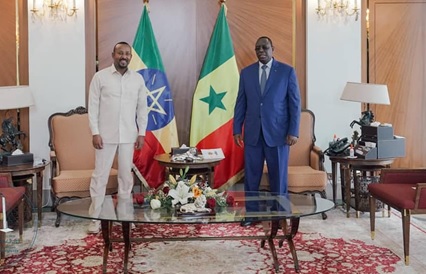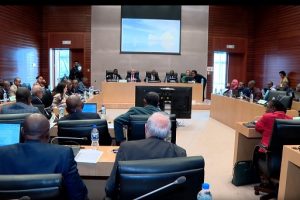
The Ethiopian government has been working closely with African nations more than ever in the face of unwarranted external pressure and mistreatment by the international community. As the west has been making an effort to twist Ethiopia’s arm by putting pressure time and again, Ethiopia has been successfully fending off the actions. However, given its increased role in the continent of Africa, aggression against Ethiopia is tantamount to aggression against the whole African Nations. After all, external pressure is all about breaching sovereignty and imposing imperialism.
Recently, Prime Minister Abiy Ahmed has paid visits to a number of African countries such as Senegal, Ghana, Uganda, and Rwanda with the intention of looking for African solutions to African problems regarding the interference of the westerners in the internal affairs of Ethiopia. In the present climate, Ethiopia has increased its diplomatic engagement with Horn region countries to create a clear understating of the situation in Ethiopia and the region.
Since the dawn of time, Ethiopia has been undertaking a role in sustaining peace and tranquility in the Horn of Africa. From sending peacekeeping missions to mediating conflicting parties, Ethiopia holds a central place in pacifying the warn-torn and volatile yet strategic region.
By the same token, Ethiopia stands shoulder high in the Horn region which is a hotbed for terrorism and human trafficking. With its growing economy and political influences, the country also wields great leverage in brokering peace deals among warring parties in states situated in the Horn. Ethiopia has for instance played a key role in finding a gray line between conflicting parties in Sudan and South Sudan.
And, many argue that this time African nations should boldly stand with Ethiopia to counter external pressure and resolve African problems using African approaches by strengthening Pan-Africanism in the continent of African. And, this was at the epicenter of Abiy’s visits to the African nations.
Conferring with Senegalese President Macky Sall, on bilateral and regional issues, Abiy stressed the need to work together in strengthening continental integration, capitalizing on shared resources, and tapping into a young human capital for continental economic prosperity.
Abiy also said the relations between Ethiopia and Senegal is founded on the spirit of Pan-Africanism which enabled the establishment of OAU/AU.
The two leaders held extensive talks on bilateral and African issues which included a common understanding on strengthening partnerships for continental growth and integration, according to FBC.
Abiy appreciated the visible changes that Senegal has undertaken under the Presidency of Macky Sall.
On his part, President Macky Sall congratulated Ethiopia for a successful conclusion to the elections and reiterated the commitment to work in close cooperation on a shared vision.
The leaders have agreed to further build on the spirit of Pan-Africanism and work together on African issues.
The Premier expressed gratitude to President Macy Sall and his government for the warm welcome reception they gave to his delegation.
In a similar vein, Prime Minister Abiy also visited Ghana where he discussed similar bilateral and regional issues. During his visit, the premier discussed with President Nana Akufo-Addo various bilateral and regional issues. Ethiopia and Ghana will work closely on bilateral and African issues of common interest, the Prime Minister said. The PM has also appreciated the president for the warm welcome.
“My appreciation to President Nana Akufo-Addo for receiving my delegation and I at the Presidential Palace in Accra for a discussion on a wide range of issues,” Abiy twitted.
Many see Abiy’s visit to the African nations as a positive move to rally African brothers in the face of foreign interventions that have been waged not against Ethiopia but the entire continent. The sad thing is external pressure unless contained with a united hand and same voice; it would tear countries apart as history showed the world already.
More clearly, in many instances, the interventions of superpowers in other countries have been counterproductive as seen in Syria, Libya, Afghanistan, Yemen, and the list goes on and on. The interventions have been pushing conflict-torn countries into uncharted territory. In the name of saving a nation, powerful nations are severing nations indeed.
Apart from causing chaos, the intervention of superpowers in the internal affairs of sovereign nations has been putting an end to some countries in the world.
In some cases, some countries turned out to be beneficial to intervene in the domestic affairs of other nations to execute their secret missions. Even worse, unjustified external intervention turned tranquility into frailties. Due to this, the idea of external intervention is becoming an increasingly debatable issue with some countries admitting fault lines.
Apart from causing chaos, the intervention of superpowers in the internal affairs of sovereign nations has been putting an end to some countries in the world.
According to a document entitled, ‘Highway to the Danger Zone: The Effect of Foreign Intervention on Political Stability,’ the effect of foreign intervention on political stability within developing states is a significant question because foreign intervention may act as a destabilizing factor. If this is the case, foreign intervention provides another possible reason for the start or rekindling of intrastate conflicts.
This time, some westerners are pulling out all the stops to repeat the same mistake in Ethiopia though Ethiopian centuries-old experiences to repel external aggression.
Notwithstanding the fact that the westerners know the fact that Ethiopia does not give the green light to westerners to interfere in its internal affairs, they kept on turning a blind eye.
In an exclusive interview with The Ethiopian Herald Andargachew Tesfahun, Assistant Professor of Political Science and International Relations at the University of Gondar said, “Superpowers do not want to interfere directly in the internal affairs of Ethiopia by deploying troops. Instead, they would like to get themselves involved in standing by the side of opposing groups and setting up a puppet government.
In point of fact, the aforementioned reality has been witnessed in various parts of the world such as South and North Korea, Vietnam, Cuba, Venezuela, and things of that sort. Through the passage of time, these nations turned out to be independent states by resisting interference. Ethiopia in this regard will come out victorious if it is able to maintain the people’s unity and rally African brothers behind its counter efforts.
BY ADDISALEM MULAT
The Ethiopian Herald 10 September 2021




